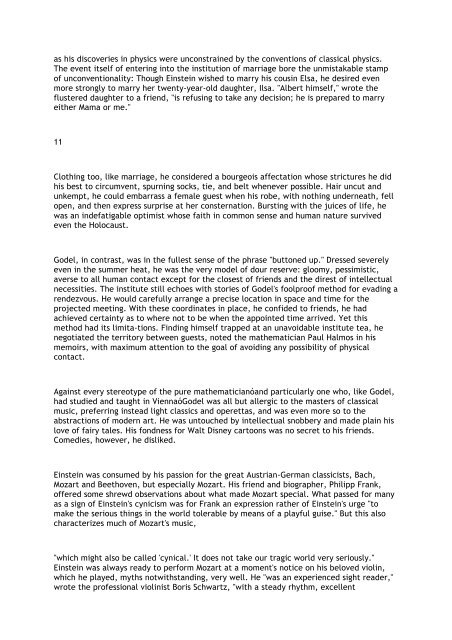Yourgrau P. A world without time.. the forgotten legacy of Goedel and Einstein (Basic Books, 2005)(ISBN 0465092934)(176s)_PPop_
Yourgrau P. A world without time.. the forgotten legacy of Goedel and Einstein (Basic Books, 2005)(ISBN 0465092934)(176s)_PPop_
Yourgrau P. A world without time.. the forgotten legacy of Goedel and Einstein (Basic Books, 2005)(ISBN 0465092934)(176s)_PPop_
Create successful ePaper yourself
Turn your PDF publications into a flip-book with our unique Google optimized e-Paper software.
as his discoveries in physics were unconstrained by <strong>the</strong> conventions <strong>of</strong> classical physics.<br />
The event itself <strong>of</strong> entering into <strong>the</strong> institution <strong>of</strong> marriage bore <strong>the</strong> unmistakable stamp<br />
<strong>of</strong> unconventionality: Though <strong>Einstein</strong> wished to marry his cousin Elsa, he desired even<br />
more strongly to marry her twenty-year-old daughter, Ilsa. "Albert himself," wrote <strong>the</strong><br />
flustered daughter to a friend, "is refusing to take any decision; he is prepared to marry<br />
ei<strong>the</strong>r Mama or me."<br />
11<br />
Clothing too, like marriage, he considered a bourgeois affectation whose strictures he did<br />
his best to circumvent, spurning socks, tie, <strong>and</strong> belt whenever possible. Hair uncut <strong>and</strong><br />
unkempt, he could embarrass a female guest when his robe, with nothing underneath, fell<br />
open, <strong>and</strong> <strong>the</strong>n express surprise at her consternation. Bursting with <strong>the</strong> juices <strong>of</strong> life, he<br />
was an indefatigable optimist whose faith in common sense <strong>and</strong> human nature survived<br />
even <strong>the</strong> Holocaust.<br />
Godel, in contrast, was in <strong>the</strong> fullest sense <strong>of</strong> <strong>the</strong> phrase "buttoned up." Dressed severely<br />
even in <strong>the</strong> summer heat, he was <strong>the</strong> very model <strong>of</strong> dour reserve: gloomy, pessimistic,<br />
averse to all human contact except for <strong>the</strong> closest <strong>of</strong> friends <strong>and</strong> <strong>the</strong> direst <strong>of</strong> intellectual<br />
necessities. The institute still echoes with stories <strong>of</strong> Godel's foolpro<strong>of</strong> method for evading a<br />
rendezvous. He would carefully arrange a precise location in space <strong>and</strong> <strong>time</strong> for <strong>the</strong><br />
projected meeting. With <strong>the</strong>se coordinates in place, he confided to friends, he had<br />
achieved certainty as to where not to be when <strong>the</strong> appointed <strong>time</strong> arrived. Yet this<br />
method had its limita-tions. Finding himself trapped at an unavoidable institute tea, he<br />
negotiated <strong>the</strong> territory between guests, noted <strong>the</strong> ma<strong>the</strong>matician Paul Halmos in his<br />
memoirs, with maximum attention to <strong>the</strong> goal <strong>of</strong> avoiding any possibility <strong>of</strong> physical<br />
contact.<br />
Against every stereotype <strong>of</strong> <strong>the</strong> pure ma<strong>the</strong>maticianó<strong>and</strong> particularly one who, like Godel,<br />
had studied <strong>and</strong> taught in ViennaóGodel was all but allergic to <strong>the</strong> masters <strong>of</strong> classical<br />
music, preferring instead light classics <strong>and</strong> operettas, <strong>and</strong> was even more so to <strong>the</strong><br />
abstractions <strong>of</strong> modern art. He was untouched by intellectual snobbery <strong>and</strong> made plain his<br />
love <strong>of</strong> fairy tales. His fondness for Walt Disney cartoons was no secret to his friends.<br />
Comedies, however, he disliked.<br />
<strong>Einstein</strong> was consumed by his passion for <strong>the</strong> great Austrian-German classicists, Bach,<br />
Mozart <strong>and</strong> Beethoven, but especially Mozart. His friend <strong>and</strong> biographer, Philipp Frank,<br />
<strong>of</strong>fered some shrewd observations about what made Mozart special. What passed for many<br />
as a sign <strong>of</strong> <strong>Einstein</strong>'s cynicism was for Frank an expression ra<strong>the</strong>r <strong>of</strong> <strong>Einstein</strong>'s urge "to<br />
make <strong>the</strong> serious things in <strong>the</strong> <strong>world</strong> tolerable by means <strong>of</strong> a playful guise." But this also<br />
characterizes much <strong>of</strong> Mozart's music,<br />
"which might also be called 'cynical.' It does not take our tragic <strong>world</strong> very seriously."<br />
<strong>Einstein</strong> was always ready to perform Mozart at a moment's notice on his beloved violin,<br />
which he played, myths notwithst<strong>and</strong>ing, very well. He "was an experienced sight reader,"<br />
wrote <strong>the</strong> pr<strong>of</strong>essional violinist Boris Schwartz, "with a steady rhythm, excellent


